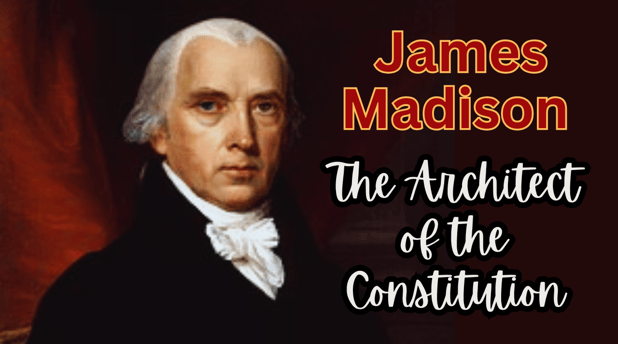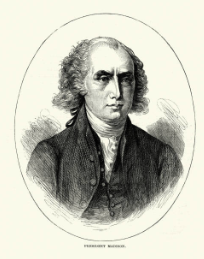"James Madison: The Architect of the Constitution"
James Madison (March 16, 1751 [O.S. March 5, 1750] – June 28, 1836) remains one of the most influential figures in American history. Often hailed as the "Father of the Constitution," Madison's intellectual prowess and dedication to the principles of republican government shaped the foundations of the United States. From his role in drafting the Constitution and the Bill of Rights to his presidency during the War of 1812, Madison's contributions to the fledgling nation cemented his legacy as a pivotal Founding Father.
Casey Adams
11/2/20234 min read


Early Life and Education
Born into a wealthy, slave-owning planter family in Orange County, Virginia, Madison was the eldest of twelve children.
He grew up at Montpelier, the family estate, where he developed a keen intellect and deep curiosity.
Madison's early education included studies under private tutors and attendance at Donald Robertson’s school, where he excelled in Latin, Greek, and classical philosophy.
In 1769, Madison enrolled at the College of New Jersey (now Princeton University), completing his studies in just two years.
He immersed himself in theology, law, and political philosophy, influences that would later inform his statesmanship.
Despite his frail health, Madison possessed a sharp and disciplined mind, qualities that propelled him into public service.
Revolutionary Beginnings
The onset of the American Revolution transformed Madison's life.
In 1774, as tensions escalated between the colonies and Britain, Madison aligned with the Patriot cause, vehemently opposing British taxation and encroachments on colonial liberties.
By 1776, he was serving in the Virginia Convention, helping to draft the Virginia Constitution and Declaration of Rights under the mentorship of George Mason.
Madison’s political career gained momentum when he joined the Virginia House of Delegates in 1776 and the Continental Congress in 1780.
He quickly distinguished himself as a committed advocate for independence and effective governance.
However, his experience in Congress exposed him to the weaknesses of the Articles of Confederation, which lacked the authority to unify the states or address pressing national issues like war debts and interstate commerce.
The Constitution and the Federalist Papers
Dissatisfied with the Articles of Confederation, Madison became a driving force behind the Constitutional Convention of 1787.
His "Virginia Plan" served as the blueprint for the new Constitution, advocating for a stronger central government with checks and balances to prevent tyranny.
Madison’s vision of federalism and proportional representation in a bicameral legislature became central to the debates.
Following the convention, Madison took on the monumental task of securing the Constitution's ratification.
Collaborating with Alexander Hamilton and John Jay, Madison co-authored The Federalist Papers, a series of 85 essays that eloquently defended the proposed Constitution.
His writings, including the renowned Federalist No. 10, articulated the dangers of factionalism and the need for a large republic to safeguard individual liberties and public stability.
Champion of the Bill of Rights
Although Madison initially doubted the necessity of a Bill of Rights, he ultimately became its champion to appease anti-Federalists and ensure the Constitution’s ratification.
In 1789, as a member of the House of Representatives, Madison drafted the first ten amendments to the Constitution, enshrining essential freedoms such as speech, religion, and due process.
This achievement further solidified his legacy as a guardian of individual rights and republican principles.
Political Rivalries and Party Formation
Madison’s political career during the 1790s was marked by intense ideological clashes with Alexander Hamilton.
While Madison had collaborated with Hamilton to ratify the Constitution, he vehemently opposed Hamilton's economic program, which included the establishment of a national bank and centralization of financial power.
Madison feared these measures would undermine states’ rights and favor wealthy elites.
In response, Madison joined forces with Thomas Jefferson to form the Democratic-Republican Party, opposing Hamilton’s Federalist Party.
This marked the beginning of the United States’ first political party system.
Madison and Jefferson championed agrarian values, limited government, and a strict interpretation of the Constitution.
Secretary of State and the Louisiana Purchase
In 1801, Madison became Jefferson’s Secretary of State, a role that showcased his diplomatic acumen.
One of his most significant achievements during this time was persuading Jefferson to secure Senate approval for the Louisiana Purchase.
The acquisition doubled the size of the United States and expanded its western frontier, demonstrating Madison’s pragmatic approach to governance.
Madison also navigated the complexities of international relations, grappling with British and French interference in American trade during the Napoleonic Wars.
These challenges would later shape his presidency.
Presidency and the War of 1812
Madison succeeded Jefferson as president in 1809.
His presidency was dominated by escalating tensions with Britain, stemming from British impressment of American sailors and interference with trade.
After diplomatic efforts and economic sanctions failed, Madison reluctantly led the United States into the War of 1812.
The war tested Madison’s leadership and the young nation’s resilience.
While early defeats, including the burning of Washington, D.C., were demoralizing, key victories like the Battle of New Orleans and the resilience of American forces fostered a sense of national pride.
The war concluded with the Treaty of Ghent in 1814, which restored pre-war boundaries but failed to address maritime grievances.
Nonetheless, many Americans viewed the war as a "second war of independence" that affirmed U.S. sovereignty.
Post-War Achievements
The war underscored the need for a stronger federal government, a realization that prompted Madison to support measures he had once opposed.
His administration oversaw the creation of the Second Bank of the United States and the Tariff of 1816, which protected American industries from foreign competition.
Madison’s pragmatic shift demonstrated his ability to adapt his principles to the nation’s evolving needs.
During his presidency, Madison also pursued policies that displaced Native American tribes, resulting in the cession of over 26 million acres of land.
This expansionist agenda, while pivotal to America’s growth, left a complex and often troubling legacy.
Later Life and Legacy
After leaving the presidency in 1817, Madison retired to Montpelier, where he continued to engage in public affairs.
He served as president of the University of Virginia and advised his successors on constitutional matters.
Despite his contributions to liberty and governance, Madison’s ownership of enslaved people and his failure to address slavery’s moral and political contradictions remain significant aspects of his legacy.
James Madison’s intellectual contributions, dedication to the American experiment, and ability to navigate political challenges have earned him an enduring place in history.
As the "Father of the Constitution," he laid the groundwork for a government that balances liberty and order.
His presidency, though marked by conflict, solidified America’s independence and set the stage for its rise as a global power.
References:
Rakove, Jack N. "James Madison and the Creation of the American Republic." Pearson, 2006.
Storing, Herbert J. "What the Anti-Federalists Were For: The Political Thought of the Opponents of the Constitution." University of Chicago Press, 1981.
Ketcham, Ralph. "James Madison: A Biography." University of Virginia Press, 1990.
Library of Congress. "James Madison: Founding Father."



James Madison

